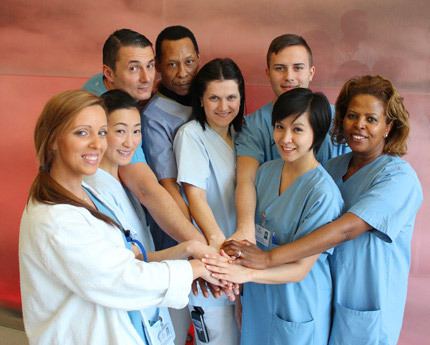Working hours are getting longer and workloads are often becoming more demanding even though we have automated many steps in our business processes. Health care is a fundamental human right, and much like the spine, it is the steady support to any society.
Certainly, the additional strain and unhealthy lifestyle that the global workforce is exposed to affects both health care systems worldwide and the beneficiaries of those systems. In the world of capitalism, companies that invest in the health of their employees should receive recognition. By putting employees first, large companies have spearheaded a movement toward employee health through safety protocols, ergonomics, and recommending overall healthy habits in the workplace.
The Government's Role
The U.S. government is doing their part to secure the health of the American workforce with 16.4 million uninsured Americans gaining health coverage since the enactment of the Affordable Care Act in March 2010.
By 2020 5.6 million jobs are going to be generated in the healthcare sector with an annual growth rate of 3 percent. Businesses with more than 100 employees are also required to provide health care to 70 percent of their workers.
By 2030 over 20 percent of U.S. residents will be over 65. Millennials and Generation Z are embracing international work opportunities and frequent travel at an earlier age than any generation before them, which leads them to a lifestyle with a hectic pace and wanting to experience life to the fullest. Consequently, increased longevity will result in more opportunities for entertainment, travel and better healthcare service in the golden, senior age for Baby Boomers and several decades from now for Generation Y and Z. As Richard Branson put it in his letter to a 10-year-old self, ''Life is for living and try to enjoy it every day.''
Health Care Workforce in Germany
Germany is one of the brightest examples among European countries that integrates immigrant workforce in order to overcome the shortage of skilled medical staff. Everybody wins in such a situation: patients and hospitals because the patient-nurse ratio increases; the home country and family of medical workers as they earn more and can send more remittances; and of course the nurses themselves because they continue to professionally develop their skills and contribute to their patients.
By 2020 Germany needs 200,000 nurses and they have expressed preference to hire Filipino workers, as their Department of Labour and Employment stated. This and many more examples of workforce fluctuation in Europe and on other continents opened the market for immigration consultancy agencies that match the skilled workers with employers, provide job permits and working visas, as well as inform about rights and responsibilities according to the law and programs of government agencies. In case of Germany, GIZ and Germany's Federal Employment Agency are creating intensive trainings and serve as the staunchest support to new workers.
The Role of Nurses
Nurses have been rated as number one profession for honesty and ethical standards for straight 13 years. Despite the praise they are receiving the conditions in which they are working can certainly get better: 81% of respondents report that they do not have time to educate patients and provide adequate discharge planning; whereas 56% report readmission to patients due to unsafe assignments and 50% report patients' injury and harm due to understaffing.
Furthermore, the access to equipment has a strong effect on patient dignity and comfort, thus contributing to the overall healthcare quality. The survey of the website Nursing Times with 600 nurses showed that only one third has the influence over the equipment being used. For instance, both nurses and patients may need TENS units for therapy of relieving the pain and in prevention but often times they are not decision-makers for those purchases.
The Growing Need for Healthcare Professionals
United Nations' Department of Economic and Social Affairs informed in the report Trends in International Migrant Stock about the shift of the global workforce with millions of people working outside of their homelands. Therefore, it becomes more challenging for the employees in high-risk professions to protect themselves and to keep on track with the legislative rules that apply to their rights and responsibilities.
Unfortunately, regarding the global workforce, accidents are common at construction sites because the employers do not provide adequate work conditions or the serious mistakes are often made along the chain of command. Luckily, professionals in the field of healthcare and law are capable of unveiling the construction accident myths related to the compensation and long-term recovery, thus protecting the vulnerable party.
In such situations medical workers are also affected since unprotected workers who fell prey to the accidents become their emergency patients, exposed to additional stress. The similar challenge happens to maritime workers, another category of high-risk professionals who need reliable healthcare support. The biggest mistake maritime workers make after such accidents is that they have built too much trust in their insurance companies and have not consulted with specialized maritime attorneys about their case.
To conclude, public administrations of both developing and developed economies face similar challenges and need to answer the same question, but their strategies and budgets may be different, ''How do we ensure that no citizen is left out? How do we enable people from all walks of life to assess medications and healthcare as their basic human right?'' The rates of seasonal and international workers are soaring, while there is the yawning necessity for medical staff who are not only competent healers, but also culturally aware professionals in the global context. For all the aforementioned reasons, the times we live in are full of exciting changes, which may not be always pleasant, but are certainly inevitable.
Photos: HealthyCafeMag and Giz.de

